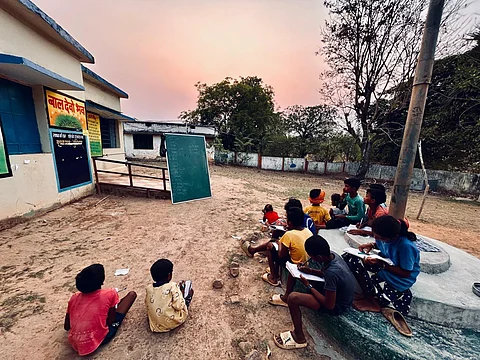

Every child deserves a safe, joyful and enabling environment to grow up in and have access and exposure towards better and holistic learning opportunities. But for millions of children around the world and in India, this isn’t always the case.
While the focus on academics and physical health and well-being of a child is crucial, an equally vital and yet often overlooked aspect of a child’s development is their holistic development which understands all the three important aspects of emotional and social well-being, academic opportunities and the much-needed support from the caregivers, teachers and community.
This is what Shiksharth has been trying to define and enable ‘positive childhood experiences’ (PCEs) through its work in the ‘Left-wing extremism’ affected tribal area of Sukma district of Chhattisgarh predominantly. PCEs are the experiences that make a child feel safe, supported and loved.
Learning Labs on the other hand tries to redefine the existing mainstream approach to teaching & learning by integrating the state-prescribed curriculum with the innovation on the pedagogical front.
The idea is to make children independent learners, focusing on the contextually relevant practices connected with the socio-cultural schematic attunement of the child, bringing relevance from their local culture, customs, practices and giving scope to learn through the intervention of their mother-tongue based education.
By involving teachers, students, and communities in the learning process, Learning Labs creates a space where education becomes a collaborative and engaging experience.
Lens of Social constructivism on Learning Labs:
At the core of Learning Labs is the belief that learning is not a one way process of knowledge and experience, but a shared process of discovery, exploration, construction of knowledge, skills and mindsets.
- The idea is to make learning possible through collaboration and dialogue: The potential of relationships as central to learning emphasises significantly relies on the child and their interaction with the caregivers, teachers & community predominantly to feel supported, challenged by taking necessary risks to unpack the potential and likely to engage in the learning process.
For instance, the position of teachers who listens and encourages children to ask questions, shares ideas, and collaborate with peers and classmates. This sense of security can become crucial in establishing a connection for effective learning.
- The significant role of culture and social contexts in shaping understanding: this helps for the child to connect and develop a significant identity and cultural pride in their existing indigenous knowledge systems and bring references into their learning process. This also helps to connect with the real world challenges and opportunities.
- The active role of learners in constructing their own knowledge
- The role of play and exploration in learning.
Learning Labs in action:
Children learning about ‘Plants and their uses’, a primary or middle grade Environmental Studies concept.
1. Field Exploration: Children visit a nearby garden or farmland in groups to observe and identify the local plants, discussing their parts and possible uses collaboratively with peers and with the supervision and guidance of a teacher acting as a facilitator.
2. Hands-on project: Groups create a ‘Plant Use Chart’ by selecting at least one plant that has come out from their field exploration observation. For example, neem for medicinal purposes, and will present their learning and findings through posters and drawings.
3. Cultural connection: the children will talk to the elders at home and villages, interact with different members of the community and understand the traditional uses of plants and share their observations, stories, practices in the class with their peer group and talk about the cultural pride in their heritage.
4. Reflection and sharing: A reflection and debrief circle allowing students to discuss what they have learned through the process and sharing their experience through any possible means of creative expression and sharing their feelings about the activity.
5. Integration of the concepts: This activity tries to blend all three aspects of learning labs by enabling contextual learning, PCEs through joyful and safe participation and social constructivism by emphasising on the aspects of collaboration and cultural relevance.
(Written by Pavan Deshmukh, a 2016 Teach for India fellow from Hyderabad, currently working as Head of Product & Pedagogy at Shiksharth Trust, which works in Sukma, Chhattisgarh on education-based interventions.)
